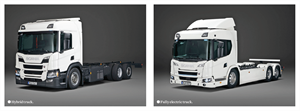Scania has recently launched its first production range of electric trucks, a milestone in the company's journey to a more sustainable transport system. The vehicles in the new range – a fully electric truck and a high-performance plug-in hybrid – focus initially on urban applications, but Scania believes long-distance electrified trucks will soon follow.
 According to Scania, transport buyers are having a strong pull on the shift of the heavy transport industry to sustainable transport solutions, particularly electrification.
According to Scania, transport buyers are having a strong pull on the shift of the heavy transport industry to sustainable transport solutions, particularly electrification.
There are several different technologies that will enable the world to decarbonise the transport system and help Scania meet its own science-based climate targets. Electrification will, without question, play a crucial part in achieving that goal.
In the mid-term, Scania expects that the total cost of ownership of battery-powered heavy distribution trucks will be comparable with vehicles powered by fossil fuels. Batteries will become less expensive, and their service life will grow. This paves the way not only for electrified distribution trucks but also, in a few years’ time, for long-distance electrified vehicles.
However, it’s not just about the vehicles, says Scania. Electrification can only take off if the infrastructure side and energy supply is up to the task. Public investment in charging infrastructure and development of the energy grid is therefore essential.
Shifting cost split
Purchasing a new truck always represents a significant investment and electric trucks are currently more expensive than conventional vehicles. But it’s also important to note that the heavy transport industry’s true measure of value comes from total cost of ownership and operation, and this is where the electric truck proves its worth. No more dealing with high and ever-fluctuating fuel bills.
As the technology develops to produce lighter, smaller, more energy-intensive models, the cost of electric-power batteries has and will continue to decrease significantly. Overall, there’s a trend towards a positive cost split for electric trucks, which is good news for fleet owners.
Competitive advantages of electric vehicles
Public policy is having a big impact on the viability of electric vehicles. A number of major cities around the world have signalled they will gradually phase out diesel vehicles from their streets. In fact, there are presently no fewer than 274 low-emission zones in 11 European countries that restrict access to polluting vehicles in cities, provinces and regions.
Such initiatives give non-fossil-fuel vehicles, especially electric vehicles, the competitive advantage of full access to city centres, something which Scania’s new electric truck is poised to exploit.
Scania’s new electric truck, along with its plug-in hybrid, is further proof that this technology has the momentum to help change the heavy transport sector, and our world, for good.
Photos: Scania’s new fully electric and hybrid trucks